You are here
New Releases
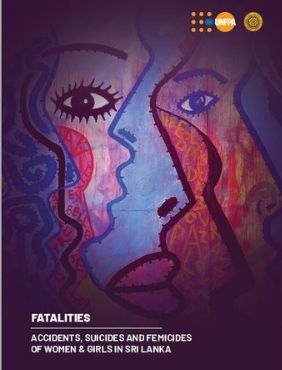
FATALITIES
A preliminary literature survey on the traumatic deaths of women and girl children in Sri Lanka revealed that published studies on the subject were scarce and included outdated statistics. This is a fundamental drawback when it comes to advocating legislative reform, developing national policies and institutional responses, as well as introducing preventive strategies and judicial redress mechanisms to address the issue. It can also impede possible community action.
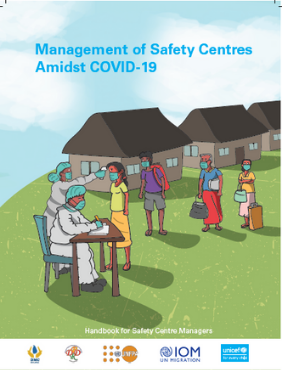
Management of Safety Centres Amidst COVID-19
Sri Lanka, an island nation, is prone to natural disasters caused by floods, cyclones, landslides, tsunami, drought and coastal erosion with increasing instances of environmental pollution related hazards as well. Though the disasters in Sri Lanka are mostly hydrometeorological in nature, epidemics such as dengue are highly prevalent in the country too. The global pandemic COVID-19 has significantly affected Sri Lanka since early 2020 and the impacts are visible across many sectors, affecting different aspects of human lives.
By evaluating the multidimensional risks of managing safety centres and /camps in the new normal, this booklet has been developed at the initiative of the Disaster Management Centre (DMC) with the support of the Disaster Preparedness and Response Division (DPRD), Ministry of Health, United Nations Children’s Fund (UNICEF), United Nations Population Fund (UNFPA) and International Organization for Migration (IOM). The booklet’s prime objective is to ensure that the key components of camp management of providing assistance and protection to persons seeking temporary shelter are followed as per accepted international standards and best practices, and is an outcome of an online or virtual training conducted on the theme of “Management of Safety Centres Amidst COVID -19” by the said organisations, in June 202.
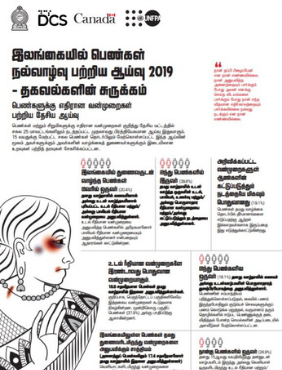
இலங்கையில் பெண்கள் நல்வாழ்வு பற்றிய ஆய்வு 2019 - தகவல்களின் சுருக்கம்
The Women's Wellbeing Survey (WWS) is the first ever dedicated survey on the prevalence of violence against women and girls conducted in all 25 districts. The Survey was conducted on all women above 15 years of age with a focus on Intimate Partner Violence (IPV). IPV is defined as physical, sexual, economic, emotional or other forms of harm perpetrated by a current or former partner or spouse.
Get the key findings of the Survey.
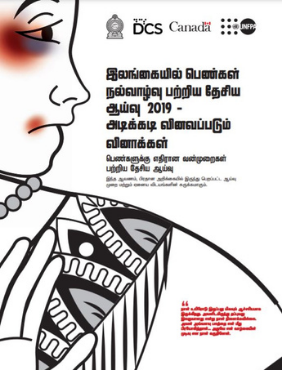
இலங்கையில் பெண்கள் நல்வாழ்வு பற்றிய தேசிய ஆய்வு 2019 - அடிக்கடி வினவப்படும் வினாக்கள
The Women's Wellbeing Survey (WWS) is the first ever dedicated survey on the prevalence of violence against women and girls conducted in all 25 districts. The Survey was conducted on all women above 15 years of age with a focus on Intimate Partner Violence (IPV). IPV is defined as physical, sexual, economic, emotional or other forms of harm perpetrated by a current or former partner or spouse.
This document is a summary of the methodology and other areas extracted from the main report. Read through for the methodology, justification, data collection teams and other frequently asked questions on the Survey.
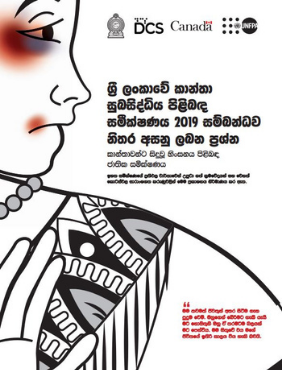
ශ්රී ලංකාවේ කාන්තා සුබසිද්ධිය පිළිබඳ සමීක්ෂණය 2019 සම්බන්ධව නිතර අසනු ලබන ප්රශ්න
The Women's Wellbeing Survey (WWS) is the first ever dedicated survey on the prevalence of violence against women and girls conducted in all 25 districts. The Survey was conducted on all women above 15 years of age with a focus on Intimate Partner Violence (IPV). IPV is defined as physical, sexual, economic, emotional or other forms of harm perpetrated by a current or former partner or spouse.
This document is a summary of the methodology and other areas extracted from the main report. Read through for the methodology, justification, data collection teams and other frequently asked questions on the Survey.
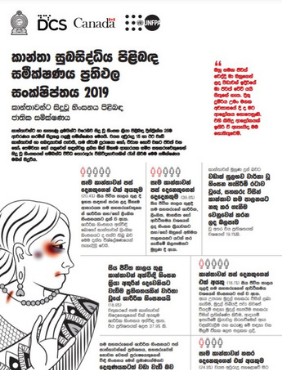
කාන්තා සුබසිද්ධිය පිළිබඳ සමීක්ෂණය ප්රතිඵල සංක්ෂිප්තය 2019
The Women's Wellbeing Survey (WWS) is the first ever dedicated survey on the prevalence of violence against women and girls conducted in all 25 districts. The Survey was conducted on all women above 15 years of age with a focus on Intimate Partner Violence (IPV). IPV is defined as physical, sexual, economic, emotional or other forms of harm perpetrated by a current or former partner or spouse.
Get the key findings of the Survey.
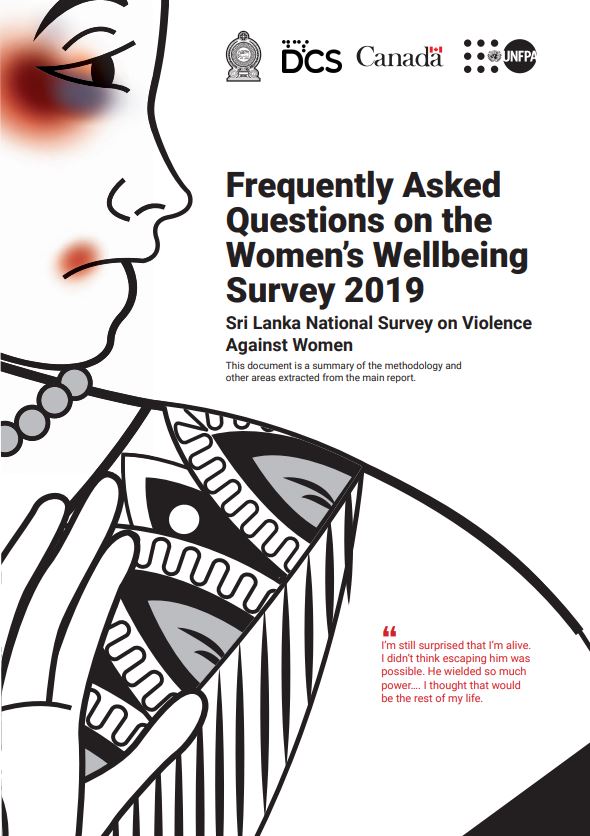
Frequently Asked Questions (FAQs) on the Women's Wellbeing Survey
The Women's Wellbeing Survey (WWS) is the first ever dedicated survey on the prevalence of violence against women and girls conducted in all 25 districts. The Survey was conducted on all women above 15 years of age with a focus on Intimate Partner Violence (IPV). IPV is defined as physical, sexual, economic, emotional or other forms of harm perpetrated by a current or former partner or spouse.
This document is a summary of the methodology and other areas extracted from the main report. Read through for the methodology, justification, data collection teams and other frequently asked questions on the Survey.
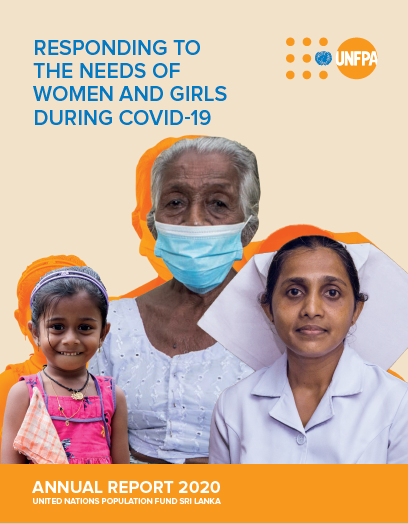
RESPONDING TO THE NEEDS OF WOMEN AND GIRLS DURING COVID-19
UNFPA is the United Nations’ sexual and reproductive health agency. Since UNFPA started its work in 1969, the world has seen progress: The number and rate of women dying from
complications of pregnancy or childbirth has been halved. Families are healthier. Young people are more connected and empowered than ever before. Women and girls are empowered to make choices on their reproductive rights.
More effort however, needs to be focused on those left behind. In Sri Lanka one in five (20.4%) ever-partnered women have experienced physical and/or sexual violence by an intimate partner in their lifetime (Women’s Wellbeing Survey, 2019). Young people have limited access to comprehensive sexuality education with a reported 50% unaware about most aspects of basic sexual and reproductive issues, which exposes them to higher risks of HIV and unplanned pregnancies (National Youth Health Survey, 2013 & 2014). The COVID-19 pandemic has also hampered progress, further exacerbating inequalities and existing vulnerabilities. Much more needs to be done to ensure a world in which all individuals can exercise their human rights, including those that relate to the most intimate and fundamental aspects of life.
UNFPA is working in Sri Lanka and the world-over to achieve three transformative results in line with the International Conference on Population and Development Agenda to ensure:
»» Zero unmet need for family planning
»» Zero preventable maternal deaths
»» Zero gender-based violence and harmful practices
To drive these results locally, UNFPA in Sri Lanka dedicated the year 2020 to comprehensively mainstream results based management across all functions of the organisation.
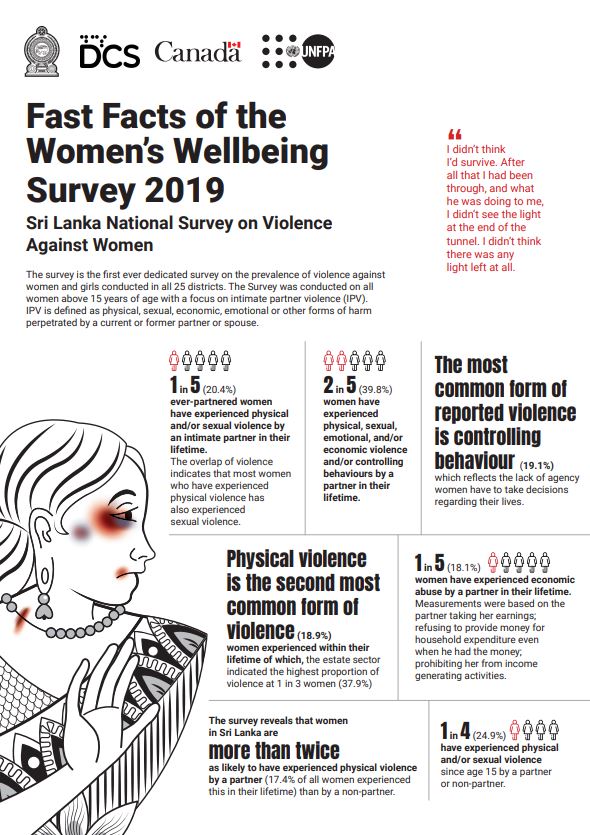
Fast Facts of the Women's Wellbeing Survey 2019
The Women's Wellbeing Survey (WWS) is the first ever dedicated survey on the prevalence of violence against women and girls conducted in all 25 districts. The Survey was conducted on all women above 15 years of age with a focus on Intimate Partner Violence (IPV). IPV is defined as physical, sexual, economic, emotional or other forms of harm perpetrated by a current or former partner or spouse.
Get the key findings of the Survey.
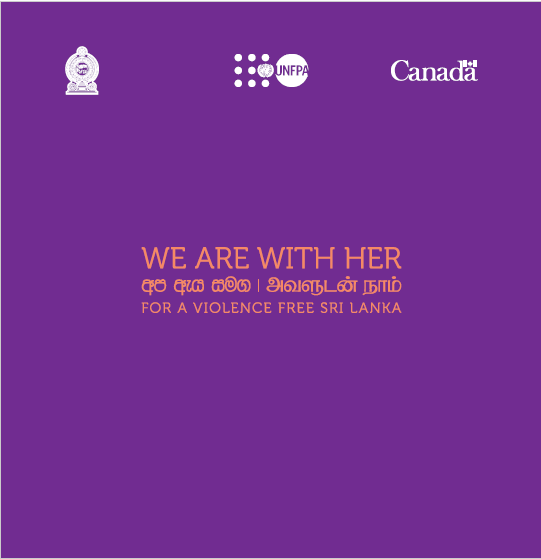
We Are With Her
Violence can impact women physically, psychologically and economically, and has serious implications on their health, their families, and communities. Responding to this violence requires a range of interlinked actions.
The United Nations Population Fund (UNFPA) together with the Government of Canada in partnership with the Ministry of Women and Child Development, Pre-schools and Primary Education, School Infrastructure and Education Service is working towards improving services and support for survivors of sexual and gender-based violence (SGBV).
Every individual featured in this publication passionately contributed to improving services for SGBV survivors in Sri Lanka, both at National and Sub-National levels in the Mannar and Hambantota districts through the project titled ‘We Are With Her’. This is a two and a half year project aimed at positioning public sector officials as advocates working to address violence against women and girls.